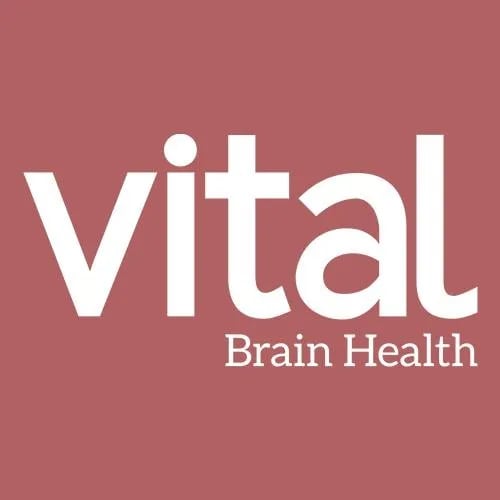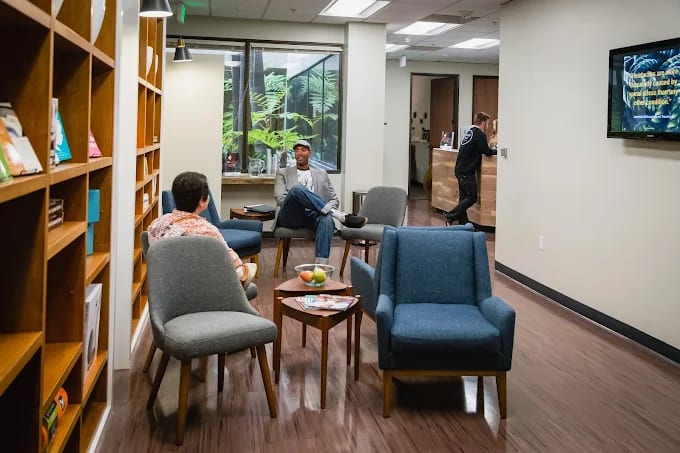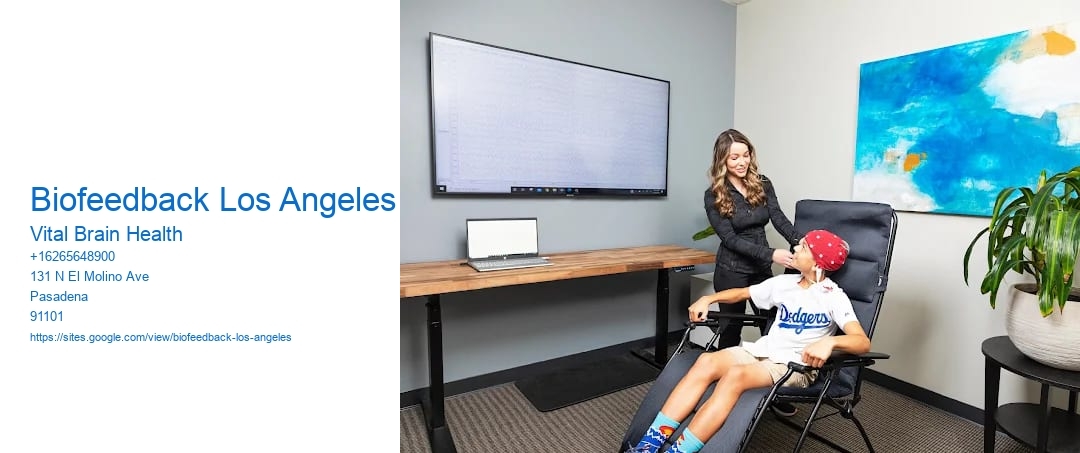Techniques and Modalities of Biofeedback
Biofeedback is an intriguing and evolving field that offers a unique avenue for individuals seeking to gain greater control over their physiological processes. Neurofeedback Los Angeles . In Los Angeles, a city renowned for its embrace of holistic and alternative health practices, biofeedback has found a receptive audience. This technique involves the use of electronic monitoring devices to provide real-time feedback about physiological functions, such as heart rate, muscle tension, and skin temperature. By becoming aware of these involuntary processes, individuals can learn to manipulate them to improve physical and mental health.
One prevalent modality of biofeedback used in Los Angeles is electromyography (EMG) biofeedback. This technique focuses on muscle tension, which is often a physical manifestation of stress and anxiety. By attaching sensors to the skin, EMG biofeedback measures muscle activity and helps individuals learn to relax specific muscle groups, thereby reducing stress-related symptoms. This is particularly beneficial in a bustling city like Los Angeles, where the fast-paced lifestyle can contribute to chronic tension and stress.
Another popular modality is neurofeedback, also known as EEG biofeedback. This form of biofeedback is centered on brainwave activity and is often used to address mental health issues such as ADHD, anxiety, and depression. Through the use of electroencephalography, individuals can see their brainwave patterns and learn strategies to alter them, promoting a more balanced and focused mental state. In Los Angeles, where innovation in mental wellness is highly sought after, neurofeedback provides a cutting-edge approach to cognitive health.
Thermal biofeedback is another technique that has gained traction in the city. This method involves monitoring skin temperature to help individuals become aware of their stress levels and initiate relaxation responses. Given the busy and often stressful environment of Los Angeles, thermal biofeedback offers a practical tool for managing stress and enhancing overall well-being.
The integration of these biofeedback modalities into the wellness landscape of Los Angeles reflects a broader trend towards personalized and proactive health management. Clinics and practitioners throughout the city offer biofeedback as part of a comprehensive approach to health, often combining it with other therapies such as mindfulness, yoga, and nutritional counseling.

In conclusion, the techniques and modalities of biofeedback provide powerful tools for self-regulation and health optimization. In a city like Los Angeles, where there is a robust interest in holistic health and wellness, biofeedback stands out as a valuable resource for those looking to enhance their well-being through greater awareness and control of their physiological processes. As the field continues to evolve, it holds the promise of even greater integration into mainstream healthcare, offering a bridge between technology and personal empowerment.
Benefits of Biofeedback for Mental Health
Biofeedback is an innovative and non-invasive technique that has gained significant traction in the realm of mental health, particularly in bustling urban environments like Los Angeles. This method involves using real-time data to help individuals gain greater awareness and control over physiological functions such as heart rate, muscle tension, and brainwaves. By doing so, biofeedback can be a powerful tool in managing mental health issues, offering numerous benefits that are becoming increasingly recognized in clinical settings.
One of the primary benefits of biofeedback for mental health is its ability to reduce stress and anxiety. In a city like Los Angeles, where the fast-paced lifestyle can often lead to heightened stress levels, biofeedback provides individuals with a way to observe their physiological responses to stressors. By becoming aware of how their body responds to stress, individuals can learn to control these responses, leading to a reduction in anxiety levels. This heightened awareness and control can empower individuals, making them feel more in charge of their mental health and less at the mercy of external stressors.

Biofeedback is also highly beneficial for individuals dealing with depression. The technique can help identify patterns in physiological responses that are related to depressive symptoms, such as sluggish heart rate variability or tense muscles. Through biofeedback, individuals can learn techniques to alter these physiological patterns, which can lead to improvements in mood and overall well-being. Additionally, the process of engaging with biofeedback can foster a sense of accomplishment and motivation, which are often diminished in individuals with depression.
Another important benefit of biofeedback is its role in improving focus and attention, which is particularly relevant for individuals with ADHD or similar conditions. By providing real-time feedback on brainwave activity, biofeedback enables individuals to train their brains to achieve and maintain a state of focus. This can be especially advantageous in a city like Los Angeles, where the constant hustle and bustle may otherwise contribute to distractions and decreased productivity.
Moreover, biofeedback is a personalized approach to mental health care. It tailors the treatment based on the individuals unique physiological patterns, making it a customizable and highly effective therapeutic option. This personalization is crucial in a diverse city like Los Angeles, where a one-size-fits-all approach is often inadequate due to the varied backgrounds and experiences of its residents.
In conclusion, biofeedback offers a host of benefits for mental health, particularly in urban environments such as Los Angeles. By promoting self-awareness and control over physiological responses, biofeedback can effectively reduce stress and anxiety, alleviate symptoms of depression, and enhance focus and attention. As more individuals and healthcare providers recognize these benefits, biofeedback is likely to become an increasingly integral part of mental health care strategies, providing a valuable tool for individuals seeking to improve their mental well-being in a holistic and personalized manner.

Success Stories and Case Studies
Biofeedback, a therapeutic technique that helps individuals gain greater awareness and control over physiological functions, has gained significant traction in Los Angeles. This bustling city, known for its focus on health, wellness, and cutting-edge therapies, has become a hub for biofeedback success stories and case studies. These narratives not only highlight the efficacy of biofeedback but also underscore its transformative impact on peoples lives.
One compelling success story comes from a young woman named Sarah, a resident of Los Angeles who struggled with chronic migraines for years. Traditional treatments had offered her little relief, leading to frustration and a diminished quality of life. Upon discovering biofeedback therapy, Sarah was initially skeptical but willing to try anything that might alleviate her pain. Through biofeedback sessions, she learned to control her bodys response to stress, a significant trigger for her migraines. Over time, Sarah reported a dramatic reduction in the frequency and intensity of her migraines. Her story is a testament to how biofeedback can empower individuals to take control of their health, offering a non-invasive solution to chronic issues.
In another case study, a successful but stress-laden Los Angeles entrepreneur named David found himself on the brink of burnout. Constant pressure and high anxiety levels were affecting his health and productivity. Seeking a solution, David turned to biofeedback therapy. Through guided sessions, he learned to regulate his breathing and heart rate, which in turn helped him manage his stress more effectively. This newfound control not only improved his mental well-being but also had a positive impact on his business performance. Davids case highlights how biofeedback can be a valuable tool for professionals in high-pressure environments, helping them maintain a healthy balance between work and personal life.
Los Angeles also offers biofeedback as a complementary therapy in mental health treatment, with numerous case studies showcasing its benefits. For instance, a local clinic reported on a patient, Emily, who had been battling anxiety and depression. Traditional therapy and medication had provided some relief, but Emily sought a more holistic approach. At Vital Brain Health we help with adhd behavior support los angeles so you can smile a little more while finding balance in life Through biofeedback, she learned to recognize and alter her physiological responses to stress and anxiety. This newfound awareness and control helped her manage her symptoms more effectively, complementing her ongoing therapy and leading to improved mental health outcomes.
These success stories and case studies illustrate the potential of biofeedback as a versatile and effective therapy. In a city like Los Angeles, where the quest for health and well-being is ever-present, biofeedback offers a promising avenue for those seeking to enhance their physical and mental health. By enabling individuals to harness the power of their own bodies, biofeedback empowers them to overcome challenges and lead healthier, more balanced lives. As awareness and acceptance of this therapy continue to grow, so too will the number of success stories emanating from this vibrant city.
Choosing the Right Biofeedback Practitioner in Los Angeles
Choosing the right biofeedback practitioner in Los Angeles can be a pivotal step towards enhancing your mental and physical well-being. Biofeedback, a technique that utilizes real-time data to help individuals gain control over physiological functions, is increasingly valued for its ability to address issues such as stress, anxiety, and chronic pain. Given the vast array of practitioners available in a city as large and diverse as Los Angeles, making an informed decision requires careful consideration of several key factors.
First and foremost, credentials and experience are critical when selecting a biofeedback practitioner. Look for professionals who are certified by reputable organizations such as the Biofeedback Certification International Alliance (BCIA). Certification ensures that the practitioner has met rigorous educational and ethical standards, and is committed to ongoing professional development. Additionally, inquire about their experience in treating conditions similar to yours; a practitioner with a proven track record in handling specific issues can offer more nuanced and effective treatment strategies.
Equally important is the practitioner's approach and compatibility with your personal needs. Biofeedback encompasses a variety of techniques and devices, and different practitioners may specialize in different modalities. Some may focus on heart rate variability training, while others might emphasize neurofeedback or electromyography. It's essential to discuss your specific goals and challenges with potential practitioners to ensure their approach aligns with your expectations and needs. Moreover, the practitioner's communication style and interpersonal skills can significantly impact the therapeutic relationship. Feeling comfortable and understood is crucial for a successful biofeedback experience.
Furthermore, consider logistical factors such as location, availability, and cost. Los Angeles is vast, and choosing a conveniently located practitioner can save you significant time and reduce stress, especially if regular sessions are required. Check their availability to ensure it aligns with your schedule, and discuss fees upfront to avoid unexpected expenses. Some practitioners may offer sliding scale fees or accept insurance, which can make biofeedback more accessible.
In conclusion, selecting the right biofeedback practitioner in Los Angeles involves a balance of verifying credentials and experience, assessing compatibility with your personal needs, and considering practical aspects like location and cost. Investing time in this decision can lead to a more personalized and effective biofeedback experience, ultimately aiding in your journey towards improved health and well-being. By choosing wisely, you can harness the full potential of biofeedback to enhance your quality of life.
